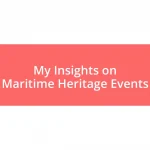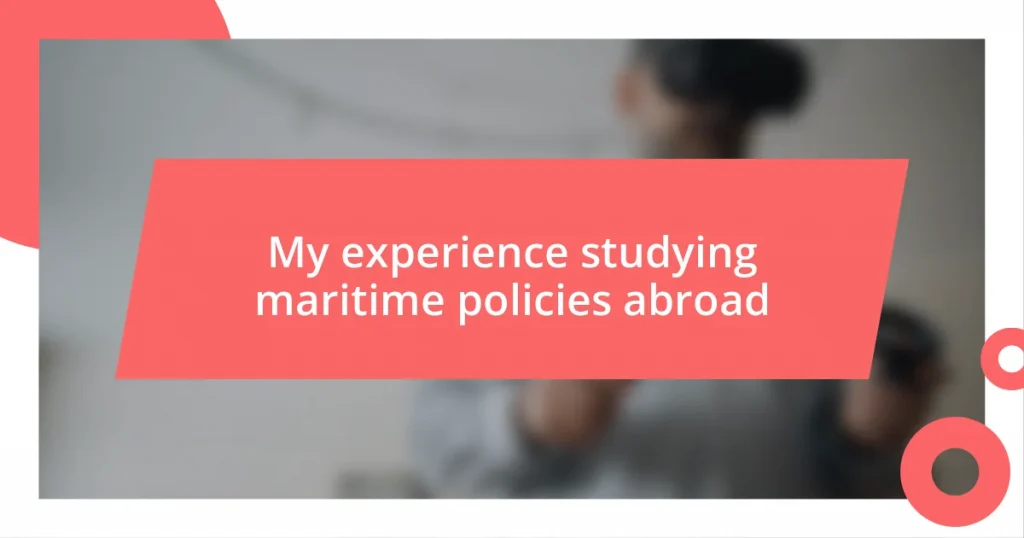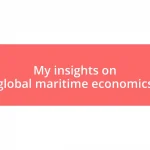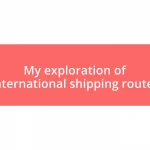Key takeaways:
- International cooperation is essential in addressing global maritime challenges, balancing economic growth with ecological responsibility.
- Networking opportunities and hands-on experiences, such as internships, are crucial for career development in the maritime field.
- Cultural adjustments while studying abroad enhance personal growth and resilience through the blending of local customs and personal traditions.
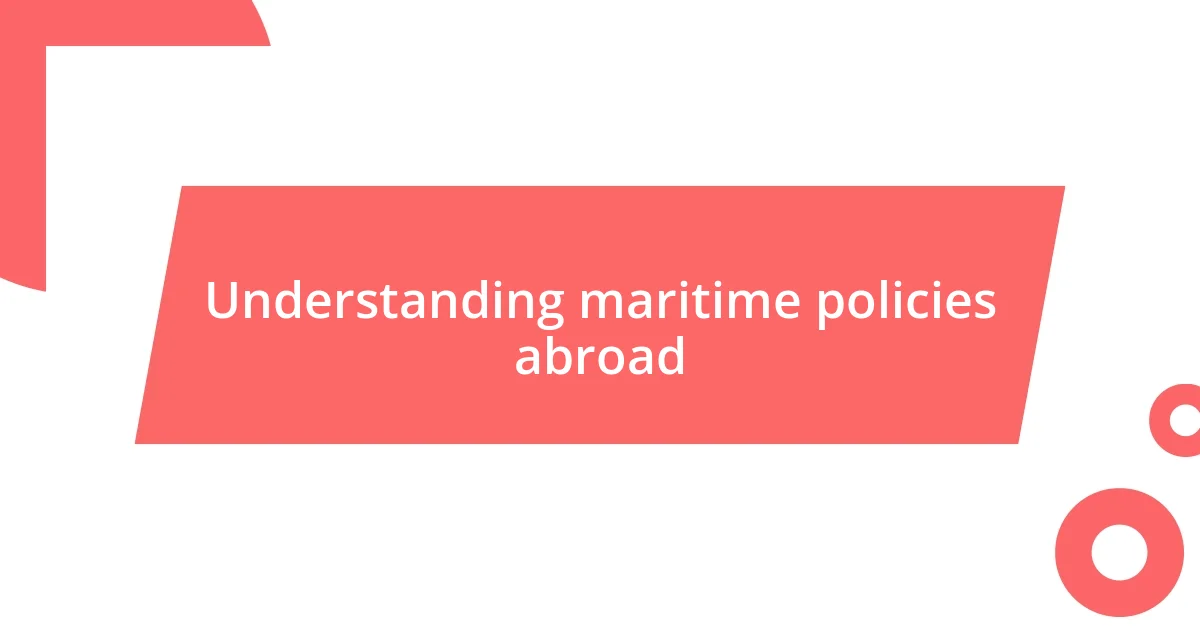
Understanding maritime policies abroad
Studying maritime policies abroad opened my eyes to the complexities of global trade and environmental protection. I vividly remember a discussion with a professor who emphasized how varying regulations in different countries can significantly impact shipping routes and sustainability efforts. It made me wonder: how can we truly balance economic growth with ecological responsibility?
One aspect that struck me was the emphasis on international cooperation. While immersing myself in case studies, I saw firsthand how countries work together to address issues like piracy or illegal fishing. This collaboration often requires navigating cultural differences, which is both challenging and rewarding. I recall participating in a workshop where diverse perspectives enriched our understanding of maritime law—it was a profound reminder of how unity in diversity can forge stronger solutions.
Engagement in policy discussions frequently revealed how these regulations are not just legal frameworks but also deeply intertwined with local communities. I saw this firsthand during a field trip to a coastal town reliant on fishing. The residents shared their fears about growing maritime policies that seemed distant yet directly affected their way of life. Listening to their stories left me reflecting on the true impact of policy decisions—how are we ensuring that local voices are heard in international dialogues?
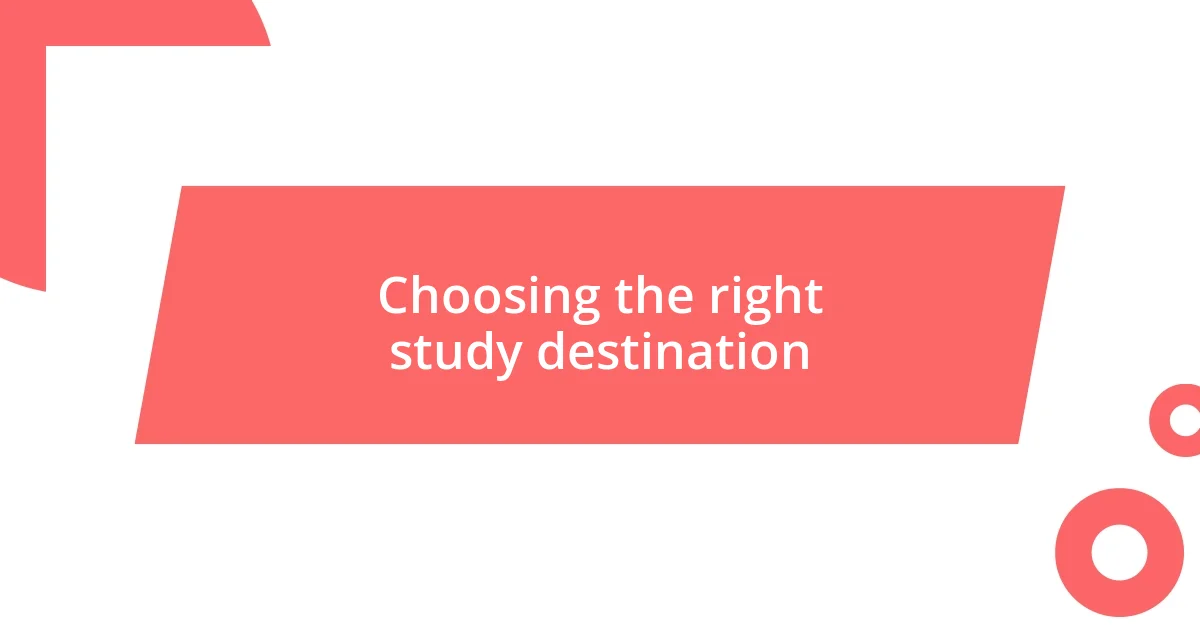
Choosing the right study destination
Choosing the right study destination requires careful consideration of numerous factors. I recall wrestling with my options, thinking about elements like language, culture, and educational standards. For me, being in a country where I could immerse myself in rich maritime traditions was essential—it added a layer of depth to my studies that I wouldn’t have found elsewhere.
Another pivotal factor was the availability of resources and connections within the maritime industry. When I was weighing my options, I learned that attending a school with robust partnerships with shipping companies and governmental bodies could enhance my networking opportunities. I remember attending an information session where a former student shared how their internships led to job offers, solidifying my belief that the right environment could set the stage for future success.
Last but not least, I found it invaluable to consider the living conditions and the overall lifestyle in each destination. What often made the most lasting impression were the smiles of the locals and the atmosphere of camaraderie in the cities I visited. Reflecting on my journey, I believe the emotional comfort of studying in a welcoming place makes all the difference in the world.
| Study Destination | Key Features |
|---|---|
| Country A | Rich maritime traditions, strong industry connections |
| Country B | Diverse culture, welcoming locals, vibrant academic life |
| Country C | Strong regulatory environment, hands-on learning opportunities |
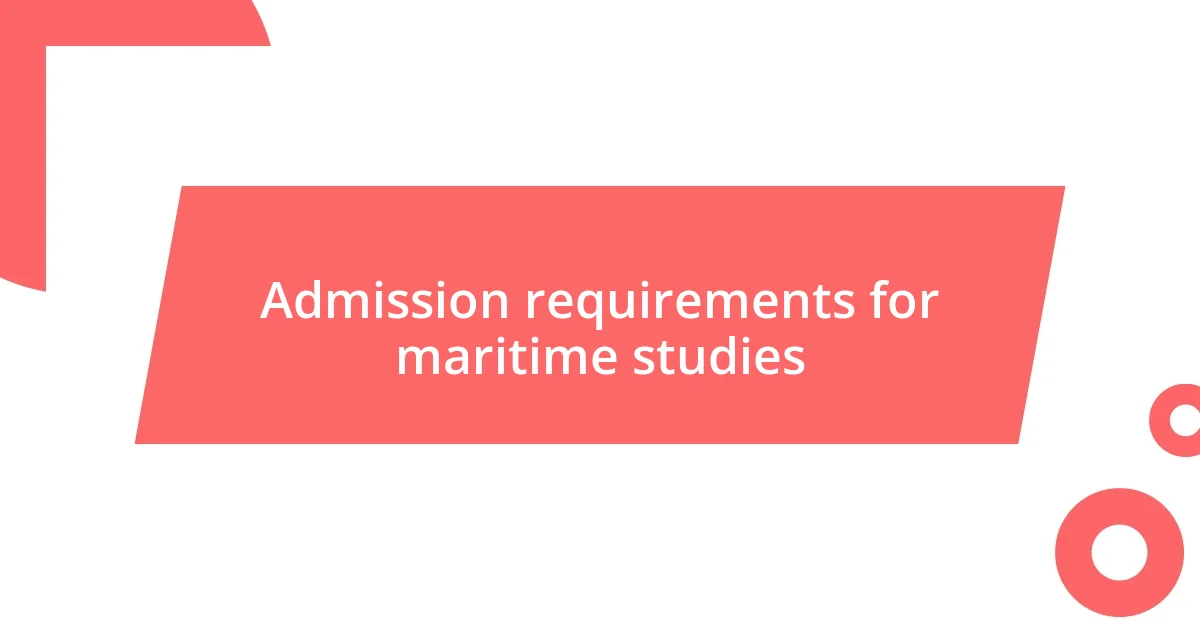
Admission requirements for maritime studies
Admission to maritime studies programs can be quite competitive. I remember feeling both excitement and anxiety during the application process. Each school had its own specific set of requirements, and understanding them was essential. While some asked for standardized test scores, others focused more on personal statements or relevant work experience. Here’s a concise list of common admission requirements I’ve encountered:
- High school diploma or equivalent
- Standardized test scores (such as SAT or ACT)
- Personal statement outlining motivation and interests in maritime studies
- Letters of recommendation from teachers or industry professionals
- Relevant experience in marine or maritime sectors (like internships or volunteer work)
As I navigated the admission landscape, I found that demonstrating my passion for the field made a significant difference. It was about more than just meeting the criteria; I had to convey my genuine interest in maritime issues. One school, in particular, encouraged applicants to bring their unique perspectives to the table. I recall the moment I realized that sharing my own experiences could set me apart; it felt liberating and empowering to think of my story as a valuable asset.
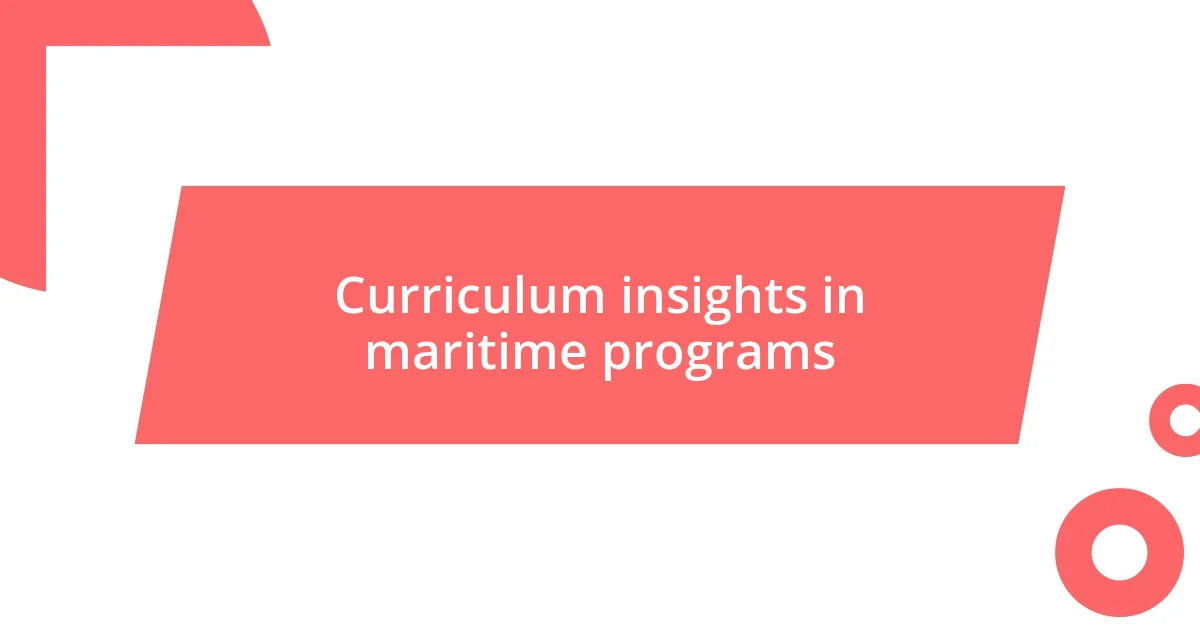
Curriculum insights in maritime programs
Once I delved into maritime programs, I was struck by how comprehensive the curricula were. Courses covered everything from maritime law to environmental policy, ensuring that we understood the multifaceted challenges the industry faces. I fondly recall a project where we simulated negotiations between countries over maritime boundaries, and it sparked a deep interest in international relations for me. Have you ever wondered how diplomacy plays into shipping routes? It’s fascinating to see these elements interconnect!
One aspect that really stood out to me was the emphasis on practical skills alongside theoretical knowledge. Many programs included hands-on components, such as internships or workshops with industry leaders. I remember a particularly eye-opening workshop where I had the chance to work on a real-life shipping case study; it connected the dots for me between classroom concepts and real-world application, igniting a passion for tackling maritime issues firsthand.
Additionally, I found that many programs encouraged a global perspective, often incorporating case studies from various regions. This approach broadened my horizons and made me appreciate the diverse maritime challenges faced by different countries. While analyzing policies from other parts of the world, I realized how interconnected our maritime strategies are—something I hadn’t fully grasped before. It’s amazing how learning about distant waters can help us navigate our local context better!
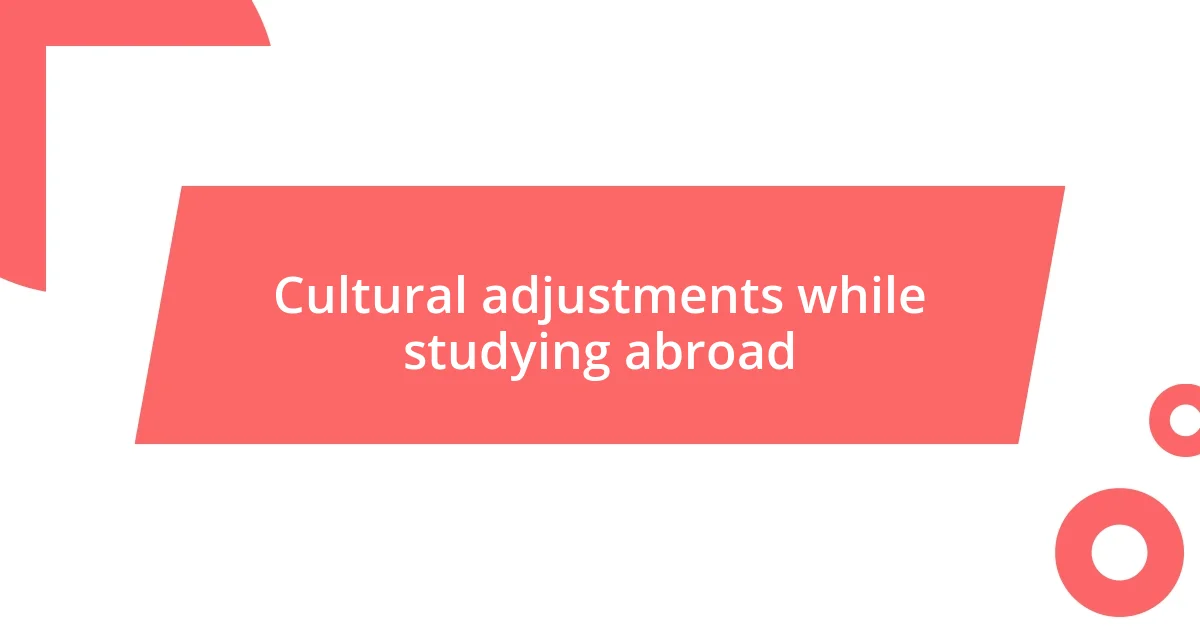
Cultural adjustments while studying abroad
Cultural adjustments while studying abroad can be quite a journey. I remember stepping into my host country with a mix of excitement and apprehension—a feeling that’s so common among students. From the food to the language, every aspect felt like a challenge. I’d often catch myself staring at a menu, struggling to decipher unfamiliar words. Have you ever felt lost in translation? It’s funny now, but those moments pushed me to embrace the culture more fully.
Adapting to local customs was another hurdle. There were times when I accidentally violated social norms, like greeting someone too formally when it was unnecessary or being too casual in a professional setting. I realized that being observant helped me navigate these differences. Watching how locals interacted gave me insights into their values and priorities. It was a bit like piecing together a puzzle; each observation opened the door to a deeper understanding of the culture.
The emotional side of cultural adjustment was quite profound as well. I often felt a sense of homesickness that crept up unexpectedly, especially during traditional holidays. However, I learned to create my own blend of local customs and my personal traditions. There was something heartwarming about sharing a meal with new friends while incorporating a dish from home. It reminded me that cultural exchange is not just about adapting; it’s also about sharing and creating connections that bridge distances. Have you ever found comfort in blending two worlds? It’s a beautiful experience that taught me resilience and adaptability.
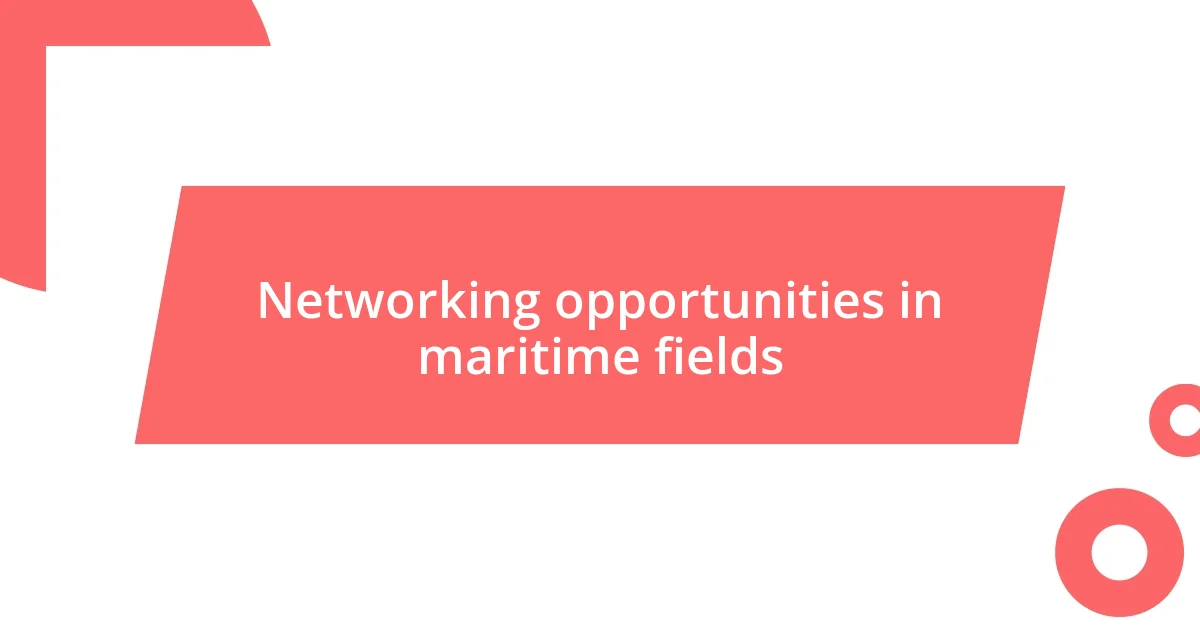
Networking opportunities in maritime fields
During my time studying maritime policies, I discovered that networking opportunities were truly invaluable. I still remember attending a maritime industry conference where I found myself in conversations with shipping executives and environmental advocates. It was a surreal experience, sharing ideas and ambitions over coffee, and it sparked new partnerships that have lasted well beyond my studies. Have you ever had a discussion that shifted your perspective completely? That was my moment.
Furthermore, connecting with fellow students from diverse backgrounds created a unique support system. We often engaged in informal meetups, discussing our career aspirations and local maritime issues. I recall a particularly impactful evening, where one friend shared their struggles in securing an internship. Together, we brainstormed solutions, and before I knew it, I was helping to connect them with key contacts I had made. Isn’t it amazing how networking can inspire collective growth?
Engaging in online platforms dedicated to maritime discussions further expanded my horizon. I remember joining a forum where industry professionals shared insights about emerging trends and challenges. One discussion about the future of sustainable shipping caught my attention and motivated me to dive deeper into research. Being part of such conversations makes you feel included in a larger community, doesn’t it? It’s a reminder of how powerful connections can lead to personal and professional evolution.
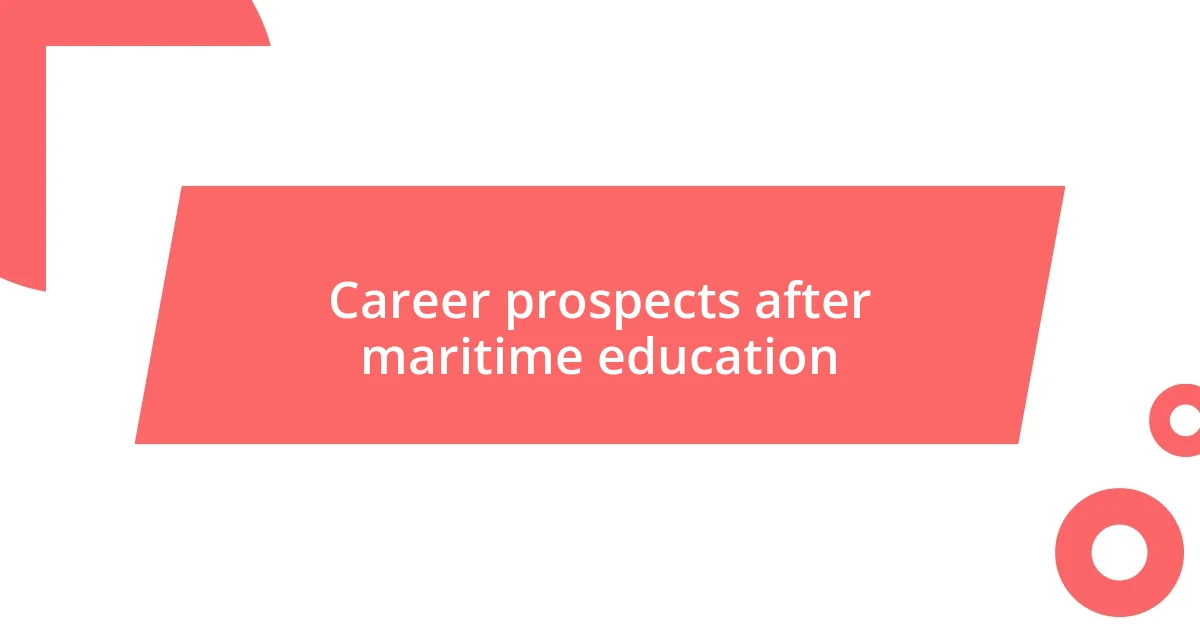
Career prospects after maritime education
Career prospects after completing a maritime education can be incredibly diverse and promising. I remember feeling a sense of exhilaration as I explored the various paths available, from shipping management to marine environmental policy. Each option seemed to open a door to new adventures. Have you ever felt excited about stepping into an unknown yet enticing world? That’s exactly how I felt, and it fueled my passion for pursuing a career in this field.
One particular opportunity that caught my eye was working in maritime law. While studying, I came across cases that highlighted the interplay between legal frameworks and maritime operations, and it struck me as both challenging and rewarding. I vividly recall a guest lecture from a maritime attorney, who shared their experiences navigating international regulations. It was fascinating to see the real-world implications of what we were studying. Isn’t it inspiring to think that your education can directly influence global practices?
Additionally, I learned that internships and fieldwork are crucial for carving out a successful career in maritime studies. I had the privilege to intern at a local port authority, where I witnessed firsthand the day-to-day operations and challenges faced in the industry. I often found myself thinking, “Isn’t this what I’ve been preparing for all along?” That experience not only solidified my knowledge but also made me realize the importance of being proactive in seeking out hands-on experience. It’s a reminder that our education is a stepping-stone, but it’s our actions that shape our trajectories.









